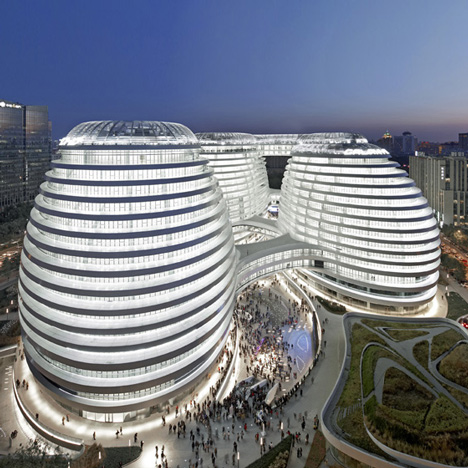News: a heritage group in Beijing has written an open letter to the Royal Institute of British Architects saying it is "disappointed and offended" that Zaha Hadid's Galaxy Soho complex has been given an RIBA International Award.
The letter from the Beijing Cultural Heritage Protection Center attacked the RIBA's decision to award the 330,000-square-metre retail, office and entertainment complex in Beijing, which it labeled a "typical unfortunate example [of] the destruction of Beijing old town."
"The Galaxy Soho project has violated a number of heritage preservation laws and regulations," said the letter. "It has also caused great damage to the preservation of the old Beijing streetscape, the original urban plan, the traditional Hutong and courtyard houses."
The letter urged the RIBA to "have a deeper understanding of the current situation in modern Chinese society." It claims the award could encourage developers and authorities to continue with the "destruction of cultural heritage sites", which it says has "been a very common offence committed by many of the growing rich and powerful."
The building is also one of three projects nominated for this year's RIBA Lubetkin Prize, alongside Gardens by the Bay by Grant Associates and Wilkinson Eyre Architects in Singapore and an affordable housing project in New York by by Dattner Architects and Grimshaw.
"These cutting-edge schemes show the leading role that architects play in delivering visionary new thinking about urban issues," said RIBA president Angela Brady on the announcement of the shortlist last month.
Completed in October last year, the Galaxy Soho complex comprises four domed structures fused together by bridges and platforms between curving floor plates.
Check out more photos of the structure taken from the surrounding streets here and take a movie tour through the complex here.
More about architecture and design by Zaha Hadid »
More about architecture in China »
Here's the full letter from the Beijing Cultural Heritage Protection Center:
An Open Letter to the Royal Institute of British Architects (RIBA) on Its 2013 RIBA Award for Galaxy Soho
To Whom It May Concern at RIBA:
From the recent Weibo (Sina miniblog) post by the Honorable Ambassador of the United Kingdom, we have learned that the Galaxy Soho project, designed by British Architect Zaha Hadid, has won the 2013 RIBA award. Many of us in China were very shocked when they learned this news. The Galaxy Soho project has violated a number of heritage preservation laws and regulations, including the Measures for the Protection of Historical and Cultural Landmarks of Beijing, The Beijing City Master Plan, and Plans for Protection of Historical and Cultural Landmarks of Beijing. It has also caused great damage to the preservation of the old Beijing streetscape, the original urban plan, the traditional Hutong and courtyard houses, the landscape formation, and the style and color scheme of Beijing’s unique vernacular architecture. During the land acquisition process, the legal rights of the original hutong residents were also grossly disregarded. The Galaxy Soho Project is definitely a typical unfortunate example on the destruction of Beijing old town; but, not withstanding, it has been selected as a winner of your award. Many of us in Beijing are very disappointed and offended.
The destruction of cultural heritage sites and the violation of the public cultural rights have been a very common offense committed by many of the growing rich and powerful in Chinese society. Some developers work hand-in-hand with some corrupted officials to encroach upon the precious cultural heritage which should be enjoyed by the entire society, while they accumulate their own personal wealth. Due to the incompetence of law enforcement institutions, this kind of destruction is growing quickly, and the deliberate neglect is epidemic.
Many residents of Beijing, including us, sincerely wish that your institution would have a deeper understanding of the current situation in modern Chinese society, the severe challenges facing cultural heritage preservation in China, as well as the indecent conduct of many greedy developers. We strongly believe that this award by your institution will only encourage these developers and authorities to continue to commit the wrongs they have done and will increase the difficulties of cultural heritage preservation in China.
We sincerely hope that RIBA will understand this sorrow and concern of the Chinese people and take action to help make up for the negative impact this award has caused.
Earnestly,
Beijing Cultural Heritage Protection Center (CHP)

